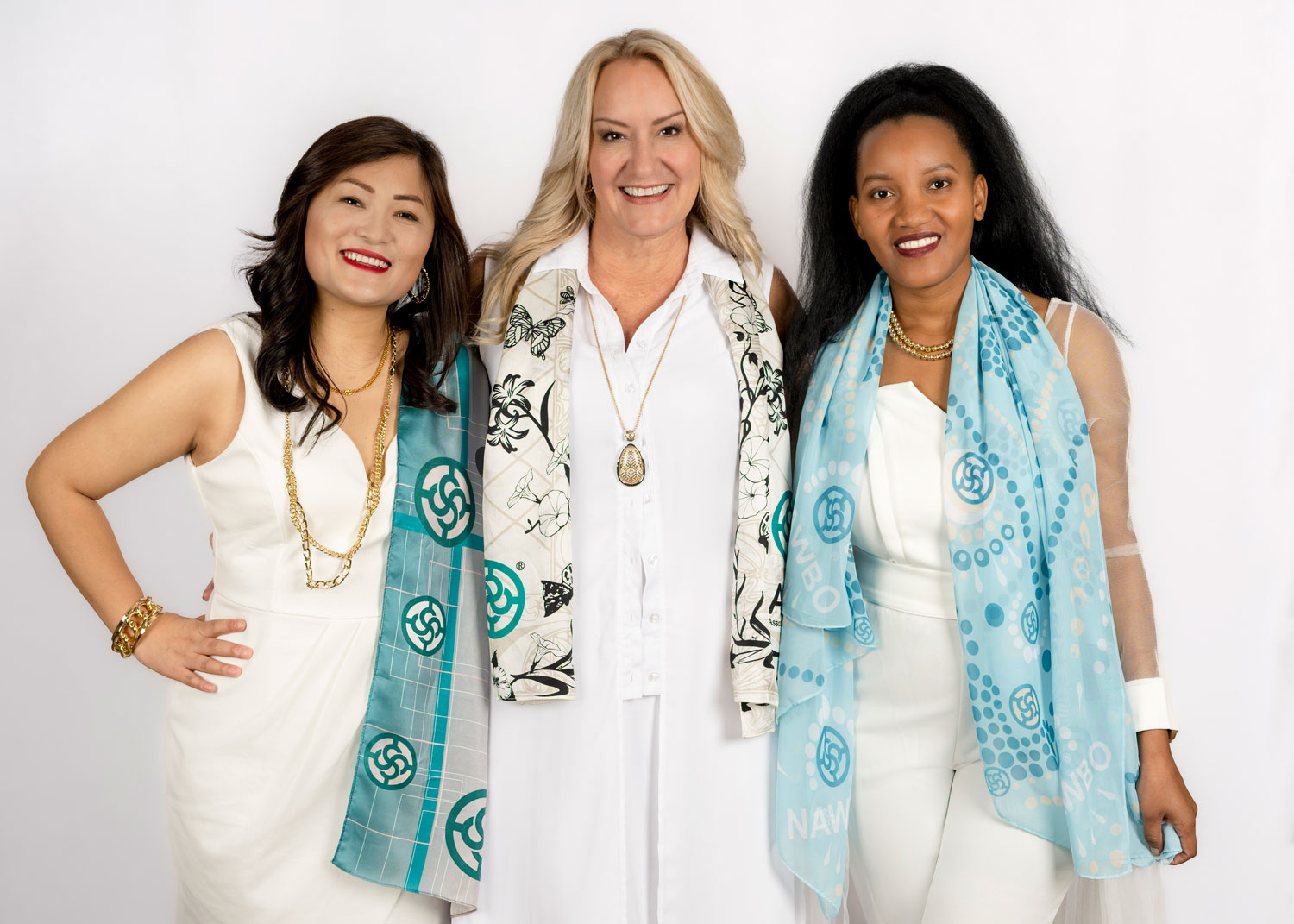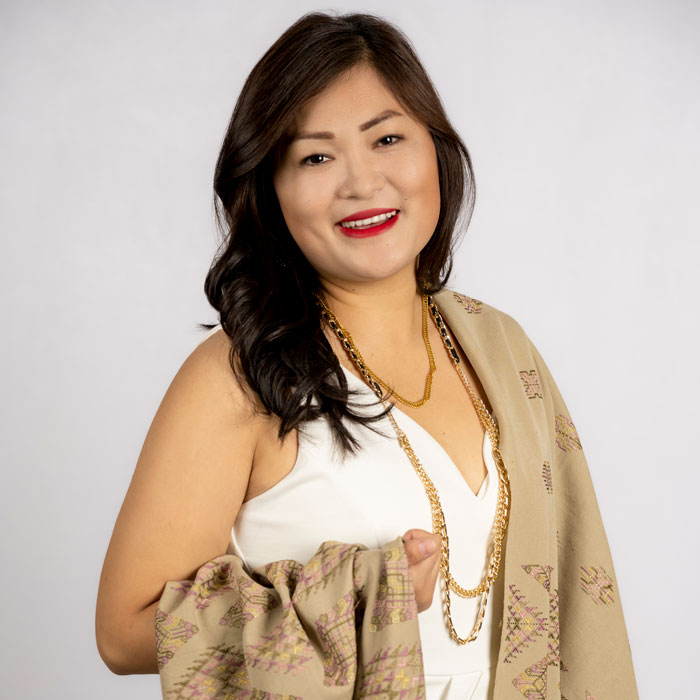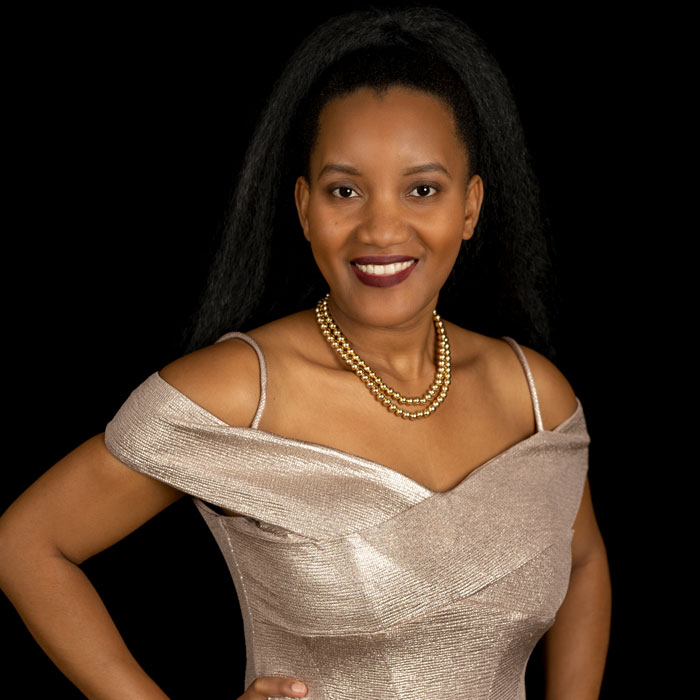Tshering Choden and Madalene Mofu Work to Empower the Women of Asia and Africa

The financial and social imperative for women’s economic empowerment is clear: greater gender equality equals greater economic growth, which leads to thriving families and communities.
That’s because women statistically reinvest their income in their families and communities at higher rates than men—so by increasing opportunities and wealth for women, we significantly improve communities for everyone. We also improve the lives of these women, giving them more choices because they have resources.
Two young women—Tshering Choden of Bhutan in Asia and Madalene Mofu of Zambia in Africa—know this well and have spent the past several months collaborating with Lynda Bishop, Vice President of National Programs for the NAWBO Institute. Tshering and Madalene are fellows of the Community Solutions Program (CSP), a U.S. State Department international exchange program in collaboration with the International Research and Exchanges Board (IREX).
CSP is a professional development program for the brightest global community leaders working on issues related to the environment, tolerance and conflict resolution, transparency and accountability and women and gender. The program includes a four-month fellowship at a U.S. community-based organization, government office or legislative body. Tshering and Madalene were matched with the NAWBO Institute for this learning opportunity.
“As the collaboration host, it has been an honor to work side by side with our fellows to expand each other’s world views, ideas and vision for the future,” shares Lynda. “The impact that we can create is exponentially increased when we work together sharing best practices and resources from across the globe.”
“We are looking forward to the next level of engagement with the collaboration grant that will make it possible for us to continue our work together on the ground in Bhutan and Zambia to encourage, support and engage women in entrepreneurship and a more sustainable future for women and the next generation in all three of our countries,” adds Lynda. “Partnering with IREX and welcoming Tshering and Madalene into NAWBO has been both educational and impactful.”
It was so impactful, in fact, that Lynda was invited by IREX (all expenses paid) to attend End of Program week in Washington, DC on November 29-December 1. Out of the 95 fellow placements, the NAWBO Institute was chosen as one of the most successful host sites this year. Lynda will be running a workshop, serving on a panel and more.
Empowering the Women of Bhutan With Soft Skills
 As a social entrepreneur and leader in Bhutan, Tshering entered CSP with a variety of career and volunteer experiences. She taught in a local high school and worked to improve community livelihood, revive dying cultures and reverse rural-urban migration patterns. She also strives to become a green business advocate.
As a social entrepreneur and leader in Bhutan, Tshering entered CSP with a variety of career and volunteer experiences. She taught in a local high school and worked to improve community livelihood, revive dying cultures and reverse rural-urban migration patterns. She also strives to become a green business advocate.
Additionally, Tshering noticed a tremendous opportunity in the transfer of knowledge from one generation to the next. “There’s a huge gap between mothers and daughters and mothers not passing down what they know,” she explains. “Many daughters never had a role model or just have the notion that men are better in office jobs or parliament positions. Bhutan is one of the happiest countries in the world, so it’s difficult for people to come out and say ‘I’m not happy about this.’”
While participating in a forum alongside women entrepreneurs, Tshering had an idea. While she was the youngest, she saw that she was the most prepared. “When they were on stage, they went numb and didn’t know what to say,” she says. “These women with so much passion, who want to be great role models, just didn’t get the opportunity to go through training like I did.”
Tshering is now working to start an institute to teach women soft skills—or as she says, “the basic skills women entrepreneurs, particularly those in rural areas, would want to have. I now realize after coming here that the NAWBO Institute does something very similar.”
During Tshering’s time collaborating with the NAWBO Institute, she’s been surprised by just how involved she’s been and how much she’s learned. “It’s more than I expected,” she says. “Initially, I thought it would be like an internship where I would do office work and then I realized that NAWBO is so inclusive.”
“We are respected collaborators,” she describes. “We were taken into networking events, into team meetings and to the National Women’s Business Conference (WBC). We were also part of the Launch Right program. NAWBO included us in everything.”
For Tshering, the most memorable part was the WBC. While she’s attended conferences in Asia, she never knew what it took to organize such a large-scale event. “That was a learning experience for me,” she says. “I was taking notes every day and observing—knowing what was happening behind the scenes compared to what participants were experiencing. There was a lot of hustling, but it was very calm and everyone was openly appreciative.”
Tshering’s non-profit, called Regenerative WEB (Women Entrepreneurs of Bhutan), will focus on training women entrepreneurs who are mothers. These women will then have the knowledge to go into schools to teach the younger generation.
Tshering’s own mother is her greatest inspiration. She was a step-daughter who didn’t have the same opportunities to be formally educated like her siblings, but learned her mother’s skills and started a textile company that’s now received national and global accolades. While growing up, Tshering often accompanied her mother into rural villages to buy raw materials for the company.
Tshering is also inspired by her NAWBO host. “Lynda is such a caring host,” she says. “She’s taught us how you can be a good host and human being. I miss home, but not as much because she has created a home here and has been a full-time supporter. She takes care of us like a mother and has tried to live up to all the objectives we set and visions we shared with her.”
“We look forward to NAWBO’s support in mentoring and guiding us,” she says about Regenerative WEB moving forward. “I’m starting something like NAWBO was 50 years ago and there’s so much we can learn from NAWBO. I know the women of NAWBO are very busy, but we need mentors who are successful at doing what we are dreaming of.”
 Improving Gender-Based Violence For Women in Zambia
Improving Gender-Based Violence For Women in Zambia
As a mental health nurse who spent five years working with Zambia’s Ministry of Health before transferring in 2018 to work for a rural hospital, Madalene has seen first-hand how economic empowerment can lead to healthier outcomes for women.
During her first year at the hospital, she found that an alarming number of the community’s women were depressed and a number had attempted suicide. While counseling the women and getting to know their personal stories, she found that many had gender-based violence in common.
“One woman told me how her husband was domestically abusing her even while she was pregnant,” says Madalene. “I felt bad. It reminded me of a time while growing up where I witnessed gender-based violence.”
This sparked a passion in Madalene. She began interviewing women about what was going on in their lives and why they stayed in abusive situations. Some shared how they had no source of income to look after themselves and their kids. Madalene wrote an abstract about insufficient resource allocation based on what she learned. She submitted it and was chosen to give a presentation.
Still, she wondered if writing and speaking about the issue was enough. She called local women together for a community engagement meeting to discuss what would help. The answer, they said, was entrepreneurship.
Madalene decided to found the Coalition for Rural Women Empowerment, a non-profit focused on helping women in the community to achieve economic empowerment and reduce cases of violence against women and girls. She began speaking to stakeholders about how they could help and hosted a fundraising event.
“I didn’t expect too much, but we had a lot of support from the area member of parliament, partner organization, the Disability Inclusion Association of Zambia, and national broadcasting cooperation,” she recalls. “The media came and captured our organization and the women, and after that, I started to get invitations to speak on gender-based violence.”
The Coalition for Rural Women Empowerment also began teaching local women business skills in their local languages. Their first workshop was on business planning. Today, this work is supported by half a dozen local and international organizations who collaborate to economically empower the women of rural Zambia through:
- Fostering Inclusions for Women and Persons Living with Disabilities program that advocates for women to take up community leadership roles
- Anti-Gender-Based Violence movement that is comprised of women who have faced some type of violence to elevate and support them
- Mentorship program for school-aged girls to help them become future visionaries and leaders
- Entrepreneurship Development program to give women skills to start and grow businesses
“My focus when I first applied for CSP was on entrepreneurship,” shares Madalene. “If they can develop entrepreneurial skills, it can help them become financially independent. That’s why the program scouted organizations that focused on this and NAWBO was one I interviewed with and loved. The organization has a lot of experience and has been around for many years. I thought it was a good opportunity to learn about leadership and have hands-on experience with an organization focused on entrepreneurship.”
Currently, Madalene is working on a community action project. With what she’s learned from her time with the NAWBO Institute, she will develop a community entrepreneurship center that brings together women for support and training.
While the center is being built, she’ll produce a documentary with the Zambian national broadcasting cooperation on gender-based violence. “Women in this movement will speak about their experiences and then we’ll use the documentary to advocate for women against violence and to elevate women’s voices,” she says. Social media around the documentary will help raise funds for the center, including various stakeholders and networks.
About her time spent with the NAWBO Institute, Madalene says, “One thing I found to be impactful is how organized NAWBO is. The team is so organized and coordinates with and supports one another. Another thing that stood out is the networking. I’ve seen a lot of businesswomen coming together. There’s a way in which they actually support one another and NAWBO makes sure of this.”
Madalene was equally impressed by her host. “I learned that Lynda always shows up and does what she says she’s going to do. There’s a lot of integrity in that and people trust you. She’s just amazing and has been very helpful for us. She’s been more like a mother taking care of us.”
An Exchange of Experiences
An international exchange wouldn’t be complete without local experiences, and Tshering and Madalene, who were based in Corpus Christi, Texas, had plenty. Tshering’s favorites were Halloween trick-or-treating with Lynda’s family, plus trips to San Antonio, New York City and Hawaii. Madalene enjoyed Dallas and all the great food—from Italian to Mexican to Chinese—and exploring San Antonio’s Riverwalk. She also loved visiting the Kentucky Derby Museum during the WBC. Last stop before they head home later this month: Tshering and Madalene have been invited to spend Thanksgiving with Lynda’s family.

